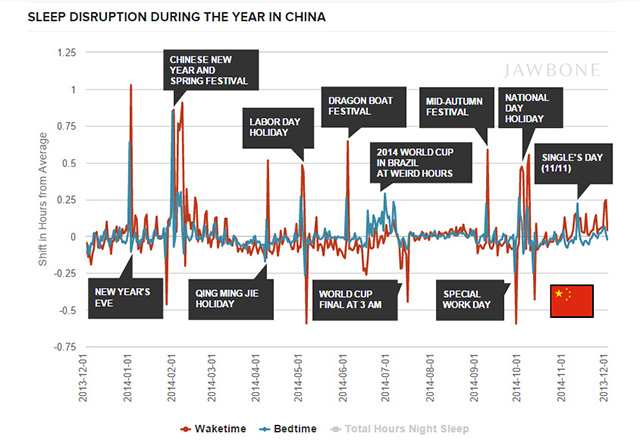Based on materials from Jawbone Blog
Anyone with an OS device Android can download the Jawbone Up application from the Play Store, which will combine the capabilities of a Jawbone bracelet with a Android gadget. The resulting combination will allow you to analyze your activity at any time and in any place. Or, for example, evaluate how you slept.

Jawbone is committed to improving the quality of sleep for UP bracelet users, considering it to be one of the most important factors affecting health. Sleep directly affects memory and creativity, weight and stress levels, school grades, and overall life expectancy. When we look at the comprehensive statistics on the subject, we see a distinct influence of the season and culture. Therefore, the company carefully collects data related to sleep around the world, and this time a specific country – China, fell into the lens of the study.
China is the first country in the world in terms of population (1.35 billion inhabitants) and the second in terms of territory. It extends 60 degrees longitude and occupies approximately 1/6 of the earth's surface. The whole country lives in one time zone, Beijing time. For example, take the first day of Chinese winter (December 21st). In Harbin, northeastern China, the sun rises at 7.11 am and sets at 15.51. In the west, in Urumqi, this happens at 9.40 and 18.35, respectively. In the south, in Hong Kong, where the longest daylight hours are 6.58 and 17.44, respectively.
- Average bedtime in China
On this map, we see how the average bedtime depends on the sun and geographic location. In the very east of the country, where the sun sets early, it hovers around 23 hours. In the west and south, where it happens later – after 1 am. Our biorhythms throughout the day are highly dependent on the sun.
| City | Bedtime | Wake up time | Sleep time, h |
| Urumqi | 00:52:00 | 08:29:00 | 6.72 |
| Zhengzhou | 00:01:00 | 07:28:00 | 6.54 |
| Xiamen | 00:22:00 | 07:40:00 | 6.48 |
| Xi'an | 00:14:00 | 07:38:00 | 6.54 |
| Wuxi | 23:52:00 | 07:22:00 | 6.72 |
| Wuhan | 00:07:00 | 07:34:00 | 6.62 |
| Wenzhou | 00:05:00 | 07:37:00 | 6.60 |
| Tianjin | 23:59:00 | 07:26:00 | 6.63 |
| Suzhou | 23:50:00 | 07:24:00 | 6.75 |
| Shenzhen | 00:23:00 | 07:44:00 | 6.54 |
| Shenyang | 23:46:00 | 07:15:00 | 6.65 |
| Shantou | 00:37:00 | 07:52:00 | 6.46 |
| Shanghai | 23:59:00 | 07:28:00 | 6.70 |
| Quanzhou | 00:32:00 | 07:46:00 | 6.39 |
| Qingdao | 23:52:00 | 07:17:00 | 6.60 |
| Ningbo | 23:54:00 | 07:25:00 | 6.69 |
| Nanking | 23:59:00 | 07:27:00 | 6.64 |
| Macau | 00:33:00 | 07:53:00 | 6.51 |
| Lhasa | 00:08:00 | 07:26:00 | 6.36 |
| Jinan | 23:44:00 | 07:16:00 | 6.68 |
| Hong Kong | 00:35:00 | 07:55:00 | 6.58 |
| Hefei | 00:02:00 | 07:25:00 | 6.55 |
| Harbin | 23:27:00 | 06:58:00 | 6.71 |
| Hangzhou | 00:01:00 | 07:31:00 | 6.69 |
| Guangzhou | 00:28:00 | 07:46:00 | 6.50 |
| Dongguan | 00:16:00 | 07:31:00 | 6.49 |
| Dalian | 23:49:00 | 07:15:00 | 6.60 |
| Chongqing | 00:24:00 | 07:46:00 | 6.53 |
| Chengdu | 00:20:00 | 07:48:00 | 6.66 |
| Changsha | 00:20:00 | 07:39:00 | 6.47 |
| Changchun | 23:35:00 | 07:01:00 | 6.61 |
| Beijing | 00:04:00 | 07:31:00 | 6.62 |
Now let's take a look at individual cities. And the first thing we learn from the study is that in no major city the average sleep time per night does not exceed 7 hours, information on China confirms this. The least sleepers are in Lhasa in Tibet – on average 6 hours 22 minutes per night. Perhaps this is due to a regime that obeys the prayer schedule. In Suzhou in the east, they sleep the longest – 6 hours 45 minutes on average. According to a famous Chinese saying, Suzhou is one of the most beautiful Chinese cities. And in neighboring Wuxi with a similar history and culture, they sleep on average 6 hours 35 minutes per night.
The time of going to bed and waking up differ even more. First of all, they fall asleep and wake up in the east, in Harbin: at 23.27 and 6.58, respectively. And the latest – in the west, in Urumqi, they wake up there at 8.29. And in the south, in Hong Kong and the Chinese Las Vegas, Macau go to bed after 0.30 and wake up around 8 in the morning. So our dream is connected not only with the geographical location, but also with the cultural characteristics of the region.
- Interruptions in sleep in China throughout the year

Finally, the company looked at how sleep changes throughout the year. The graph shows how the time of going to bed, waking up and total sleep time change during the year in mainland China. It also reflects how different events in the year make people sleep deprived or, conversely, get better sleep.
- Most 'sleepless' time of the year: FIFA World Cup final. There is an obvious lack of sleep on June 12 – July 13. Germany's game with Argentina kicked off at 3 a.m. China time on July 14, and UP users nationwide fell 31 minutes in sleep that night, the most in a year.
- Latest bedtime: New Years Eve and Chinese New Years Eve. These are, respectively, 0.42 and 0.59. Also, Chinese New Year's Eve is the time of the longest TV show, the New Year's show on CCTV. About 800 million people at this time do not sleep until at least midnight to watch this program with their families and celebrate the New Year.
- Special working days. To make up for lost work time during the holidays, China declares certain Saturdays and Sundays to be 'special working days', or weekdays. On holidays, people get some sleep, as in the Golden Week in early October, timed to coincide with the Founding Day of the PRC. However, September 28 (Sunday) and November 11 (Saturday) were assigned workers, respectively, there was a lack of sleep compared to a normal weekend.
- Singles Day (Chinese Cyber Monday). November 11, Singles Day, can be considered a relatively new holiday for the Chinese. Free youth aged 20-30 go on blind dates and have fun at karaoke. In 2009, the Chinese giant Alibaba threw a huge sale on that day, and in 2014 the event brought in a total of $ 9.3 billion. Against this background, American Cyber Monday, with its 2 million, looks pale. The Chinese, accordingly, do not sleep on the night of November 10-11 in anticipation of online sales.
Thus, information about how the Chinese sleep provides a unique cultural and geographical picture.
Notes. Research based on data from hundreds of thousands of Jawbone UP devices. Sparsely populated regions are combined in statistics with neighboring regions to obtain a clearer picture, which could be blurred at the expense of provincial territories. Total sleep time does not differ from region to region as much as bedtime and wake-up times because it excludes the time spent in bed before falling asleep and after waking up and waking up during the night. All information
